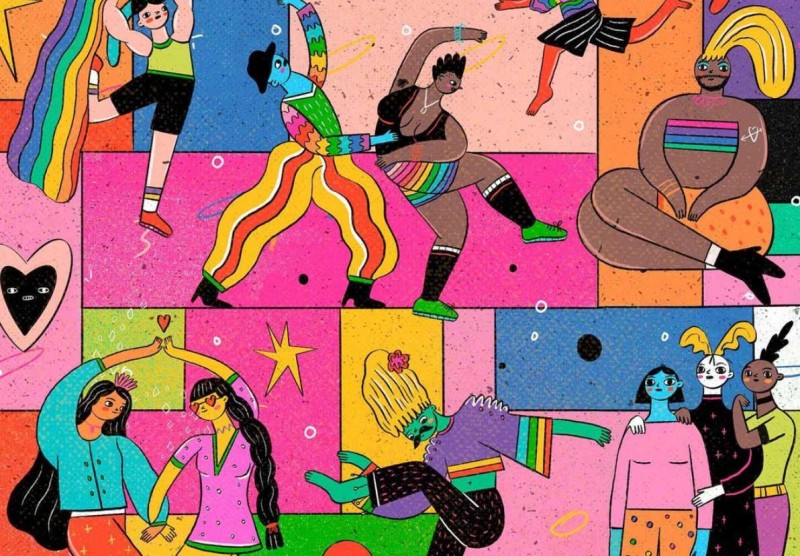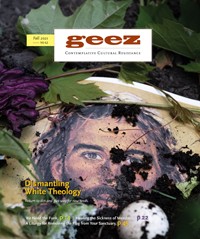We Need the Funk

Catalina Vásquez, “Celebrating LGTBIQ+ Pride by Dejusticia,” 2020.
The two of us have kicked off countless antiracism and anti-oppression trainings by asserting, not half in jest, that “diversity trainings ruin well-meaning white people.”
But it’s not the trainings, really. It’s the whole moralistic ethos that focuses on getting everything right and avoiding what is wrong: Never use this word. Always use that word. Say “BIPOC,” not “people of colour.” Never cry in a mixed group. Intervene in instances of oppression, but remember that you are not a saviour. Speak up and stand up, but also, step back and yield the mic. These injunctures yield stiff, stilted white people who may successfully “perform” antiracism for limited periods of time but have little capacity for joy or genuine relationship across lines of difference.
For this, we blame personal piety and the distorted moralistic theology it rode in on. This theology is endemic to the North American colonial project and inseparable from white supremacy and racial capitalism. With the arrival of European colonists on this continent, Christendom (Christianity distorted to serve imperialism and colonialism) mixed with Enlightenment empiricism and individualism to form a new theology that, among other things, presumed that good and evil could be empirically identified and located in particular places. It was possible to divide the “civilized” from the “uncivilized,” the “good” from the “evil”/ the “heathen” / the “animal,” so that the latter could be converted through enslavement, disposed of through genocide, burned as witches, or, in the case of the land itself, subdued by white settlers through cultivation.
Within the U.S. context, Christianity has become a moral system that divides the world into right and wrong, good and evil. And the goal, always, is to be one of the good ones, which means avoiding everything bad, such as failure, mistakes, body, sweat, sex, the earth, illness, pain, depression, movement, darkness, dance, grief, rhythm, cathartic joy – in other words, “the funk” (thank you, George Clinton). Being good – not love or justice or aliveness, but will-power, strength – is the highest ideal. Violence and aggression is the method, even if aggression is turned toward the self. Security is the promise. We are safe through adherence to the code of morality. If you are beaten, choked, spit upon, raped, killed by police, you must have done or said or worn something wrong. Therefore, you can be thrown away, consigned to physical or social death. You are disposable, and worse, you are a contaminant to the rest of us.
From Genesis to Revelation, from apple-induced exile to the rapture of the righteous, the interpretation of scripture within American Christendom is about separation and disposability.
This is not solely a function of the Christian right. Left-leaning activists, Christian or not, have been forged within an ethic of purity that we sometimes call “salvation by right opinion.” Unwilling to be tainted by the imperfect political analysis or divergent viewpoints of others, we confine ourselves to smaller and smaller echo chambers and throw away those who do not pass the righteousness test. More and more knowledge of causes, or ingestion of the visions of others, does not provide an escape from powerlessness; even that which is intellectually transparent releases no power for real change. Despairing in the face of our comparatively clearer understanding of structural sin, we (especially progressive white people) resort to a kind of asceticism, renouncing consumption, comfort, success, or achievement of any kind. We welcome the pruning back of our joy through moralism and rigidity or, exhausted and sold out, simply live in a more comfortable world – read: self-congratulatory, self-preserving, techno-savvy, numbed out, and incapable of engagement in the messiness of relationship.
A moralistic theology leads us to avoid relationship. We have no capacity for relating to other people because people compromise our perfection with their sweaty humanity, and in the same way we cannot relate to our fallible, aching selves but must perform a rigid and joyless march toward some impossible platonic ideal of the Good.
The most terrifying quality of a broken society is the absence of joy.
Joy finds no place in a moralistic religion. Joy is messy, unpredictable, kinesthetic, embodied, and erotic. It blurs boundaries wherever moralism attempts to draw them. Joy is intricately interwoven within a relational universe, and it insists that right action be worked out, not on the sterile surgical table of moralism, but in the steaming cauldron of relationship.
Emmanuel Levinas wrote about the ethical encounter as a moment of coming face-to-face with the Other. In that encounter, we recognize that we are irrevocably already in relationship with this Other, that the space we take up, simply by being us, impacts the Other. In Totality and Infinity, Levinas writes:
The being that expresses itself imposes itself, but does so precisely by appealing to me with its destitution and nudity – its hunger – without my being able to be deaf to that appeal. Thus in expression the being that imposes itself does not limit but promotes my freedom, by arousing my goodness . . . The will is free to assume this responsibility in whatever sense it likes; it is not free to refuse this responsibility itself; it is not free to ignore the meaningful world into which the face of the Other has introduced it.
There is no neutrality here, no way of being purely good – just a bottomless well of ethical desire. We will fail in our responsibility to this Other. We will unwittingly do harm, and so we must enter into repentance, falling back into the possibility of a new beginning through surrender to that Love which is beyond ourselves.
Real joy cannot be birthed when we are trying to distance ourselves from the suffering of others. We must instead enter into that suffering, recognize that we are implicated in it, find forgiveness, and be empowered to live in a different way. In this process, we encounter a Power that restores that which we thought had been lost, namely, relationship. (This is our understanding of the Fall – that the issue in the garden was not a failure of obedience but a breaking of relationship through hyperindividualism, shame, and hiding.) Joy means being born anew, becoming a child of God (Love) and being for others. In joy, relationships become radicalized in reclamation – getting something back that was previously thought of as waste.
This joy is not measured, careful, pre-planned; it has nothing to do with trying to be good. Joy is not synonymous with a stable position or sense of certainty; it meets us in the unstable and literally “unsettling” journey of decolonization, #LandBack, and reparations. This is life lived in scorn of the personal consequences and in hope that Love might be made manifest on this land. We engage in restitution projects not as a way of being good, but as a commitment to the joy that unfolds as we come into deeper and more honest and more mutual relationship.
We are telling you our own story. Our joint anti-oppression work has been forged in the heat of our own complex and evolving cross-racial friendship. We have loved each other for many years, shared resources, and accompanied each other through many changes; we have also yelled at each other, fought, done harm, separated for a time, learned, shared the impact with each other, and come back together again. And again. It has not always been fun or easy, but today our friendship is suffused with joy.
This is joy as a verb. Perhaps “to joy” is to enter fully and unabashedly into the messiness of relationship, which is to say the messiness of life, and there to sing like Miriam, dance like David, be amazed, wonder, be renewed by giving ourselves, and rejoice in the goodness of creation. This is joy, not separate from grief, mourning, repentance, suffering, and pain, but all bound up in it.
Joy is funky, and we need the funk.
Lynice Pinkard is a Black, queer, North Carolina-based writer, speaker, spiritual director and public intellectual focused on freedom from what she calls “empire affective disorder.”
Nichola Torbett is a white settler living on unceded Ohlone land in what is now called Oakland, California. She walks dogs for a living and does justice work to stay alive.



Start the Discussion